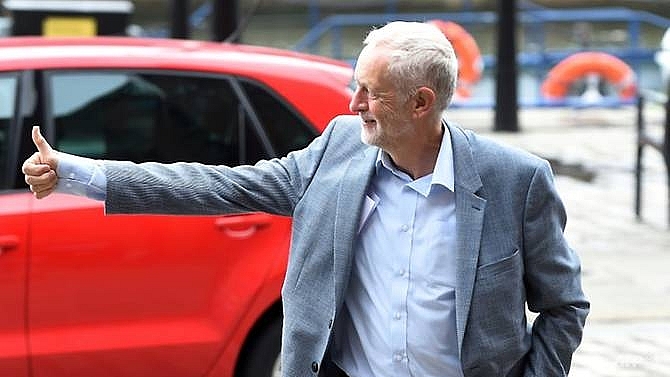UK Labour seeks to solve Brexit split, anti-Semitism row
 |
| Labour leader Jeremy Corbyn has a golden opportunity to capitalise on Prime Minister Theresa May's weakness after European Union leaders rejected her Brexit plans on Thursday. (Photo: AFP/Paul Ellis) |
With Theresa May reeling after European Union leaders rejected her Brexit plans, it is the first conference that party leader Jeremy Corbyn can see a realistic route to becoming prime minister.
But the 5,000 pro-EU protesters who marched to the conference centre in Liverpool, north-west England, highlighted the pressure he is now under to steer his party towards a second Brexit referendum.
Party members expected to vote in favour of such a measure on Tuesday, throwing up ideological and practical concerns for veteran socialist Corbyn.
He has long been a critic of the EU's free-trade policies and must also find a way to reconcile the traditional working-class wing of his party, who mostly voted for Brexit, and his own army of younger supporters that want to stay in the bloc.
Demonstrators waved EU flags and placards reading "Theresa May, we have the final say" and "A People's Vote - For the Many" as they marched through the city to the conference hall.
"If Jeremy Corbyn were to come out and support a second referendum, and they had a snap election next month, I think they would win," said Claire Hallett, 60, who was with her dog Desmond, draped in an EU flag.
But counter-protester Les Thomas, a self-described socialist, highlighted Corbyn's quandary, saying "the working class people I know, they've joined the Labour party but are firmly in the Brexit camp ... I don't think that gap can be bridged".
Corbyn has so far tried to avoid the divisive subject, instead sticking to promoting a domestic social agenda that helped him upset the odds at last year's general election and strip May of her parliamentary majority.
But with Brexit negotiations rapidly heading nowhere as the Mar 29 deadline looms, party members are demanding action.
Corbyn told the BBC on Sunday he would "adhere" to whatever came out of conference, although he would prefer to hold a general election instead.
"We could well be looking towards a general election and you know what? We are ready for it," he said.
Protester Gail Birch, a Labour member, urged Corbyn to focus on Brexit and "put aside all thoughts of a general election" because "it's going to happen anyway".
'ABRASIVE LANGUAGE'
Another issue potentially hampering Corbyn's designs on power is the anti-Semitism row that has dogged the party since he took over in 2015.
He recently admitted the party had a "real problem" with the issue.
More than a hundred people attended a rally in a pub on Sunday to draw attention to anti-semitism, with a dozen MPs and two rabbis addressing the crowd.
"We anticipate attacks from the far-right ... but his year we have experienced attacks from the left," said MP Luciana Berger.
Fellow MP Ruth Smeeth added: "I can't believe we ended up here but we will win this fight.
"The next party in government is not going to be a racist party, it is inconceivable, so we will win".
The National Executive Committee (NEC), the party's ruling body, agreed this month to adopt in full an international definition of anti-Semitism for its code of conduct.
Yet it did so only after overcoming fierce opposition from those in the party who believe it will limit criticism of Israel.
"I will die fighting racism in any form," Corbyn said when asked directly by the BBC whether he was an anti-Semite.
Labour's polling numbers have remained relatively stable throughout the scandal, said Steven Fielding, professor at University of Nottingham, but the row continues to reverberate through the party.
"There is a lot of resentment, a lot of bitterness which I don't think will be very easily dispelled," Fielding said.
The scandal has deepened the divisions between Corbyn's far-left supporters and the more centrist faction of MPs who held power in the party after Tony Blair took charge in 1994.
These centrist MPs now find themselves on the sidelines and battling for their political lives in the face of aggressive attempts by Corbyn's supporters to de-select them, with the NEC on Saturday voting for changes that will make the process easier.
"The language is getting very, very abrasive," noted Anand Menon, political professor at King's College London.
What the stars mean:
★ Poor ★ ★ Promising ★★★ Good ★★★★ Very good ★★★★★ Exceptional
Related Contents
Latest News
More News
- Russian President congratulates Vietnamese Party leader during phone talks (January 25, 2026 | 09:58)
- Worldwide congratulations underscore confidence in Vietnam’s 14th Party Congress (January 23, 2026 | 09:02)
- Political parties, organisations, int’l friends send congratulations to 14th National Party Congress (January 22, 2026 | 09:33)
- 14th National Party Congress: Japanese media highlight Vietnam’s growth targets (January 21, 2026 | 09:46)
- 14th National Party Congress: Driving force for Vietnam to continue renewal, innovation, breakthroughs (January 21, 2026 | 09:42)
- Vietnam remains spiritual support for progressive forces: Colombian party leader (January 21, 2026 | 08:00)
- Int'l media provides large coverage of 14th National Party Congress's first working day (January 20, 2026 | 09:09)
- Vietnamese firms win top honours at ASEAN Digital Awards (January 16, 2026 | 16:45)
- ASEAN Digital Ministers' Meeting opens in Hanoi (January 15, 2026 | 15:33)
- ASEAN economies move up the global chip value chain (December 09, 2025 | 13:32)

 Tag:
Tag:




















 Mobile Version
Mobile Version